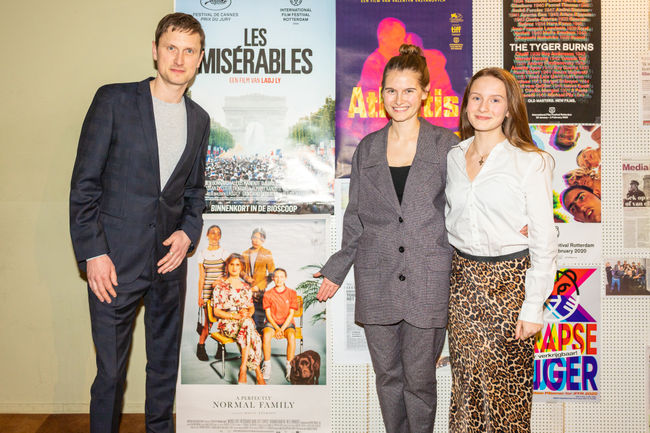A documentary would have been unethical
31 January 2019
Filmmaker Sergei Loznitsa talks about Donbass
Written by Anton Damen
I can’t say I’m surprised that people do terrible things, but I am about how easy it is to incite them to do so.
— Sergei Loznitsa
Donbass is cleverly structured in 12 segments: an accumulation of everyday incidents in the Ukrainian region lorded over by criminal gangs, the local army and Russian troops. The structure betrays Loznitsa’s background (he was originally a mathematician) and his experience with documentaries. Multiple scenes were inspired by realistic, raw footage of both sides of the conflict found on YouTube and social media. “I can’t say I’m surprised that people do terrible things”, says Loznitsa about what he saw there, “but I am surprised about how easy it is to incite them to do so. Many poorly educated people are ripe for manipulation. There’s a thin line between humanity and base instinct.”
Despite his documentary experience, one thing was clear to Loznitsa and that was that his film, about the hell that is the Donbass region in Ukraine, had to be a feature film. “A documentary on this subject would have been impossible – far too dangerous with all the shootings and murders going on – and completely unethical. If someone had told me I could shoot a documentary on this subject I would have called them nuts. How can you, as a filmmaker, witness murder?”
How can you, as a filmmaker, witness murder?
— Sergei Loznitsa
But couldn’t he have distilled a collage essay from all the footage he encountered? No, no, counters Loznitsa with conviction. “A film has to be organised in a particular way, it has to be given a style and be visualised correctly.”
“Take, for instance, the segment in which someone is tied to a lamppost and then beaten up. The original incident is on YouTube and is much more intense than the one in my film. Longer too, something like 30 minutes. They beat him, they have some drinks, they chat up some girls, beat him again, they’re having tons of fun. Incredibly humiliating.” You have to lighten reality up a bit for a film, Loznitsa continues. “So when you see the scene in my film, you don’t see as much blood and I’ve placed the camera so you don’t see the blows.”
Something can be too realistic. Many of the amateur actors in Donbass have painful experiences with the violence of war. Loznitsa listened to their stories and incorporated a lot of their suggestions into shooting, but skipped some. “The scene in which the men are ordered to all leave the bus and strip to their underwear went exactly like that in real life, one of the actors told me who had experienced something similar. One detail was wrong though: all my separatists have good teeth whereas in reality they all have blackened, rotting teeth. I didn’t change that, because you run the risk of being exaggeratedly realistic.”
General on set
“As a director you make one after the other decision like this; a million proposals a day”, Loznitsa relates. He calls cinema a ‘totalitarian art form’ with the director as the dictatorial general. “On set I say yes or no all day. This moustache or that one? These boots or those type of boots? Should the actor walk through the frame left to right or right to left? Should they stand, sit or jump? Someone has to make those decisions.” With which he seems to say: democracy is precious – except on film sets.
In the end, Donbass won Loznitsa the prize for best director at the Cannes film festival. “Yes, I now have a piece of paper that says I’m the best director,” he laughs self-deprecatingly, “but it wasn’t the main competition, was it? So that makes me more a sergeant than a general.”

